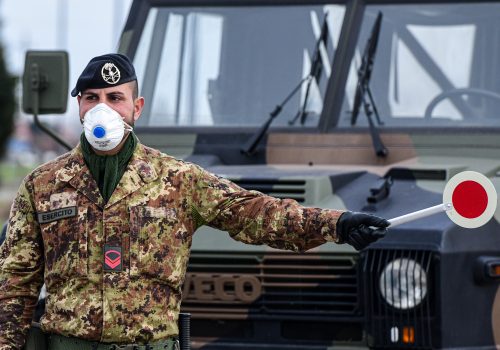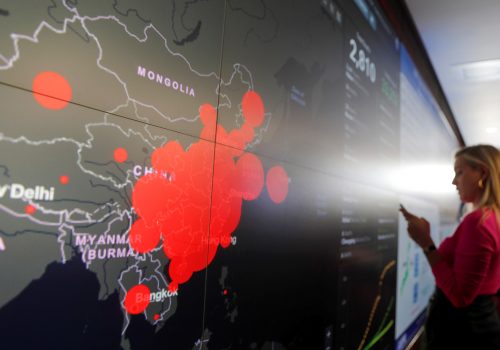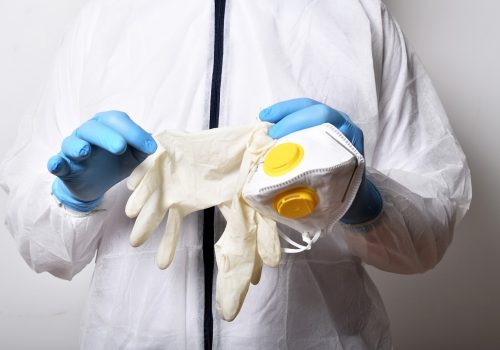CORONAVIRUS ALERT: 3/2/2020
The Atlantic Council’s Coronavirus Alert is a regular summary of policy, economic, and business events around the emergency. To stay updated, email coronavirus@atlanticcouncil.org with “Subscribe” in the subject line.
SUMMARY:
A leading international organization warned of the risks of global recession sparked by coronavirus. Earlier, stock markets had recovered after central bank announcements aimed at reassuring investors. More cases were confirmed globally, with a second death in the United States. Disruptions to business and travel increased.
STATISTICS
Coronavirus has infected more than 88,000 people and the death toll exceeds 3,000, mainly in China. Sixty countries have been affected.
QUOTE: “We’re all in this together. And I, frankly, am grateful for the spirit that I have heard from—from many public officials at every level, Republicans and Democrats, who have said, this is a time to set aside recriminations or blame and really work the problem.” Vice President Mike Pence speaks with Maria Bartiromo on Morning Futures on Fox News.
HEALTH AND MEDICAL: Second US Death
- The United States recorded a second death in Kirkland, Washington where six coronavirus cases have been recorded at a nursing facility. “There were troubling new signs that it was spreading undetected in some American communities for weeks while the government resisted calls for more widespread testing,” the New York Times reported. The United States has so far reported eighty-eight cases.
- South Korea reported 599 more cases, bringing the total infections to 4,335, second only to China. Twenty-six people have died from the virus there, according to the Korea Centers for Disease Control and Prevention.
- The UK’s Health Secretary told the BBC that “an emergency ‘battle plan,’ drawn up if the virus spreads further, includes “banning big events, closing schools, and dissuading people from using public transport.” If the outbreak worsens, people could also be urged to work from home, the BBC reported. Cabinet ministers have been attending No. 10 Downing Street for a Cobra national security committee meeting chaired by the Prime Minister Boris Johnson.
- “Major cities around the US didn’t wait for federal health officials to tell them to brace for an outbreak of the coronavirus—some have been preparing for weeks,” reports Bloomberg. “Around the country, city emergency officials are getting daily updates in calls with the CDC and coordinating their responses with nearby jurisdictions, including airports and shipping ports, which are seen as the most likely arrival point for the virus.”
- As well as fighting the disease itself, policy makers face an “infodemic”—false information spread rapidly. “The theory that the virus started in the Wuhan lab has been picked up primarily by fringe sites and social media pages dedicated to conspiracy theories and further amplified by people with large public profiles online,” writes the Atlantic Council’s DFR Lab. “The DFRLab tracked the origin of the conspiracy theory to see where the theory originated, where it spread, and which groups or individuals amplified the narrative.”
QUOTE: “We’ll need diplomatic efforts to drive international collaboration and data sharing. Developing antivirals and vaccines involves massive clinical trials and licensing agreements that would cross national borders. We should make the most of global forums that can help achieve consensus on research priorities and trial protocols so that promising vaccine and antiviral candidates can move quickly through this process.” Bill Gates, writing in the New England Journal of Medicine.
FINANCE AND ECONOMICS: OECD WARNING
- The OECD, which groups most of the world’s leading economies, has warned about the economic impact of coronavirus in its latest interim economic outlook. “Covid-19 is spreading from China to other regions causing human suffering and economic disruption. It is raising health concerns and the risk of wider restrictions on the movement of people, goods, and services, falls in business and consumer confidence, and slowing production,” said the OECD.
- “Even in the best-case scenario of limited outbreaks in countries outside China, a sharp slowdown in world growth is expected in the first half of 2020 as supply chains and commodities are hit, tourism drops, and confidence falters. Global economic growth is seen falling to 2.4% for the whole year, compared to an already weak 2.9 % in 2019.”
- “But broader contagion across the wider Asia-Pacific region and advanced economies—as has happened in China—could cut global growth to as low as 1.5% this year, halving the OECD’s previous 2020 projection from last November.” The report includes recommendations for government policy to support health systems and boost economies.
- “The OECD became the first international organization to sound the alarm about coronavirus on Monday,” said the Financial Times.
- Earlier, Japan’s central bank followed the US Federal Reserve in committing to support markets, and stocks recovered around the world. In an emergency statement, Bank of Japan Governor Haruhiko Kuroda said the bank “will closely monitor future developments, and will strive to provide ample liquidity and ensure stability in financial markets through appropriate market operations and asset purchases.” Last week stock markets suffered their worst falls since the financial crisis of 2008.
BUSINESS AND TRAVEL: Disruption as energy conference cancelled
- The annual CERAweek energy conference in Houston has been cancelled, the latest sign of the impact the disease is having on business activity. “The World Health Organization raised the threat level on Friday, the US government cancelled a summit meeting scheduled in Las Vegas, an increasing number of companies are instituting travel bans and restrictions, border health checks are becoming more restrictive, and there is growing concern about large conferences with people coming from different parts of the world,” said IHS Markit, conference organizer. The American Physical Society’s March meeting in Colorado, set to involve 10,000 people, has also been cancelled.
- American Airlines has joined other airlines by announcing that it will waive change fees for customers who buy tickets between March 1 and March 16, in an effort to reassure travelers. United Airlines has scaled back some international routes. “Though many carriers have temporarily cut flights or suspended routes to affected regions due to a drop in demand, airlines have also started to adopt measures to help curb the spread of the virus through global travel by introducing measures like limiting in-flight services, disinfecting aircraft, equipping crew with face masks, and conducting temperature checks before allowing passengers to board planes,” reports Business Traveller magazine.
- Nike, the sportswear company, temporarily closed its headquarters to clean it. “We are aware of the presumptive case of coronavirus (COVID-19) in Lake Oswego. While we have no information indicating any exposure to Nike employees, out of an abundance of caution, we are conducting a deep cleaning of our campus,” a Nike spokesperson told Footwear News.
- The Louvre, the world’s most visited museum, closed at the weekend after “all the staff present on Sunday met and voted for the right to withdrawal ‘almost unanimously,” Le Figaro reported. “’We expect a little more care in the measures to protect us,’ a union leader said, asking in particular for the large-scale availability of sanitizer gel for hand washing, and the return of the windows separating the cashiers from the public.”
- The opening race of MotoGP, the motorcycle racing World Championship, scheduled to take place in Qatar on March 8, was cancelled because of the spread of the coronavirus, the International Motorcycling Federation (FIM) announced. Sports events around the world have been hit by concerns about illness .
- In Japan, the emergency is shifting work-life patterns, reports the Nikkei Asian Review. “In a country known for its long working hours, shuttering schools means depriving many families of much needed childcare services. Companies have responded with a number of measures, including shorter business hours, teleworking, and flexible working times—all measures that the government has been trying to promote for years to modernize the country’s work culture and address such issues as overwork-related deaths.” But it says “the question is whether these changes will stick after the crisis has passed.
QUOTE: The 1918 outbreak of Spanish flu “influenced the course of the first world war and, arguably, contributed to the second. It pushed India closer to independence, South Africa closer to apartheid, and Switzerland to the brink of civil war. It ushered in universal healthcare and alternative medicine, our love of fresh air and our passion for sport, and it was probably responsible, at least in part, for the obinfluenced session among 20th century artists with all the myriad ways in which the human body can fail.” Quoted from Pale Rider by Laura Spinney in the Guardian.
RESOURCES
- Johns Hopkins University has developed an interactive web-based dashboard hosted by the Center for Systems Science and Engineering (CSSE) to visualize and track reported cases in real-time.
- CDC provides frequent updates and background information on Coronavirus.
- The World Health Organization provides daily situation reports.
- Harvard Business Review has guidance on managing the emergency for corporate decisionmakers.
- CDC has provided interim guidance on company policies.
- The Society for Human Resource Management for has a set of resources on managing communicable diseases.
- The Wall Street Journal has a useful guide to travel and travel insurance.



